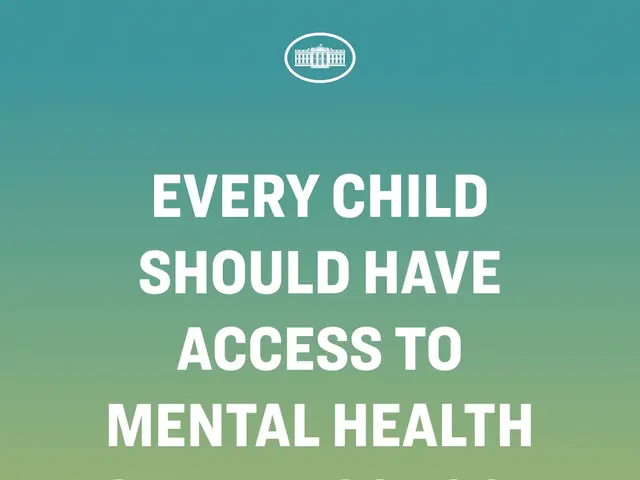Exploring the Complex Link Between Depression and Tinnitus: Uncovering the Enigma
Tinnitus ain't just a pesky sound bothering your ears; it can be a serious pain in the neck (literally) when it starts meddling with your mental health. The constant ringing, buzzing, or whistling can take a heavy toll on your well-being, leading to heaps of frustration and anxiety. And guess what? Depression might be waiting just around the corner, knocking on your door.
Millions of people worldwide are dealing with this condition, with tinnitus affecting around 15% of the general public, and depression affecting over 264 million folks globally. Researchers are digging deep to uncover the intricate link between these two, as the relationship has stirred up a fair amount of interest in the medico-science community.
Let me fill you in on the lowdown. Tinnitus is a phantom sound that rears its head when you've got an underlying condition, like hearing loss, ear injury, or circulatory system disorders. Depression, on the other hand, is a condition that's dominated by feelings of sadness, hopelessness, and a lack of interest in daily activities. Both conditions share more than just a time on the calendar; they've got a complex relationship that's driving researchers up the wall (in a good way).
The Psychological Impact of Tinnitus
Tinnitus can wreak havoc on your emotional health. Subjects with tinnitus often complain of feeling frustrated, panicky, and helpless. The relentless noise can mess with your sleep patterns, make it hard to focus, and even push you away from social situations. All these factors can fuel the fire of depression or worsen existing symptoms.
The mental nastiness doesn't stop there, buddy. Tinnitus is the adrenaline shot that kicks off anxiety. Many tinnitus sufferers report increased stress levels and worry about their condition, which can crank up the pressure even more. This vicious cycle of anxiety and tinnitus can wear you down.
The Depression-Tinnitus Connection: Is It a Two-Way Street?
Depression might cause tinnitus, or tinnitus could be the culprit behind depression. It's a classic "chicken or the egg" situation, and researchers are still trying to get to the bottom of it. Many experts believe that the relationship between the two ain't simply one-sided; they can influence and exacerbate each other.
There are various factors at play here. For example, chronic stress can serve as a risk factor for both depression and tinnitus. The intricate weave between stress, depression, and tinnitus underscores the interplay between these conditions. Chronic stress can trigger changes in brain chemistry that might contribute to both depressive symptoms and altered auditory perception.
The Exciting World of Neurobiology: What's the Connection?
To better understand the mysterious connection between depression and tinnitus, researchers have set their sights on the brain. Studies have revealed shared neural pathways between these two conditions, offering insight into their potential connection.
One area of focus is the role of neurotransmitters, particularly serotonin. Serotonin is a well-known player in mood regulation, but it also plays a role in auditory processing. Imbalances in serotonin levels have been linked to both depression and tinnitus, suggesting a possible neurochemical link between the two conditions.
Brain plasticity, the brain's ability to reorganize itself by forming new neural connections, may also be at play. Chronic tinnitus can cause changes in the brain's auditory processing centers, while depression can impact various brain regions involved in mood regulation. These neuroplastic changes could create a feedback loop, reinforcing the connection between the two conditions.
Bringing It All Together: Treatment Approaches
Recognizing that both depression and tinnitus require attention, researchers have come up with some promising treatment approaches to tackle the co-occurrence of these conditions.
- Cognitive Behavioral Therapy (CBT): This form of psychotherapy has proven effective for both depression and tinnitus. CBT helps individuals develop coping strategies and change negative thought patterns associated with both conditions.
- Antidepressant medications: Some antidepressants, such as selective serotonin reuptake inhibitors (SSRIs), have shown promise in alleviating both depressive symptoms and tinnitus perception, although the impact on tinnitus can vary among individuals.
- Sound therapy: This approach uses external sounds to modify the perception of tinnitus. Sound therapy can help reduce the perceived intensity of tinnitus and may also have a positive impact on mood.
- Lifestyle changes: Adopting healthy lifestyle habits, like regular exercise, stress reduction techniques, and maintaining a well-rounded diet, can benefit both depression and tinnitus.
Veterans, Pay Attention: VA Disability Ratings for Tinnitus and Depression
For veterans, understanding the VA disability ratings for tinnitus and depression is crucial. Both conditions are often service-connected and may be eligible for compensation and treatment through the VA healthcare system.
Wrapping It Up: Unraveling the Mystery
The connection between depression and tinnitus is complex and multifaceted. Although we've made considerable headway in understanding their link, a whole lotta questions remain unanswered. Future research directions might include exploring genetic factors that could predispose individuals to both conditions, investigating new treatment approaches that target shared neural pathways, and developing more tailored treatment plans based on individual neurobiological profiles.
For those suffering from both depression and tinnitus, it's essential to seek professional help. A comprehensive treatment approach that addresses both conditions can lead to significant improvements in the quality of life. Remember, you ain't alone in this struggle, and effective treatments are at your fingertips.
As we continue to unravel the mystery of the depression-tinnitus connection, one thing is crystal clear: addressing mental health issues is just as crucial as managing the physical symptoms of tinnitus. By acknowledging and treating both aspects, individuals can find relief and regain control over their lives.
Sources
- American Tinnitus Association. (2021). Understanding the Facts. https://www.ata.org/understanding-facts
- World Health Organization. (2021). Depression. https://www.who.int/news-room/fact-sheets/detail/depression
- Langguth, B., Landgrebe, M., Kleinjung, T., Sand, G. P., & Hajak, G. (2011). Tinnitus and depression. The World Journal of Biological Psychiatry, 12(7), 489-500.
- Salazar, J. W., Meisel, K., Smith, E. R., Quiggle, A., McCoy, D. B., & Amans, M. R. (2019). Depression in patients with tinnitus: A systematic review. Otolaryngology-Head and Neck Surgery, 161(1), 28-35.
- Bhatt, J. M., Bhattacharyya, N., & Lin, H. W. (2017). Relationships between tinnitus and the prevalence of anxiety and depression. The Laryngoscope, 127(2), 466-469.
- Bauer, C. A., & Brozoski, T. J. (2001). Effect of gabapentin on the sensation and impact of tinnitus. The Laryngoscope, 111(10), 1793-1800.
- Cima, R. F., Andersson, G., Schmidt, C. J., & Henry, J. A. (2014). Cognitive-behavioral treatments for tinnitus: a review of the literature. Journal of the American Academy of Audiology, 25(1), 29-61.
- Tinnitus is not merely an annoying ear disturbance; it can have significant impact on people's mental health, causing feelings of frustration, anxiety, and hopelessness.
- The constant noise from tinnitus can disrupt sleep patterns, affect focus, and even lead to avoidance of social situations, which may fuel symptoms of depression.
- Researchers are exploring the brain's role in the complex relationship between tinnitus and depression, noting shared neural pathways and the potential impact of imbalances in neurotransmitters like serotonin.
- Various treatment approaches, such as cognitive behavioral therapy (CBT), antidepressant medications, sound therapy, lifestyle changes, and VA disability benefits for veterans, can help alleviate both depression and tinnitus symptoms, improving individuals' overall quality of life.







